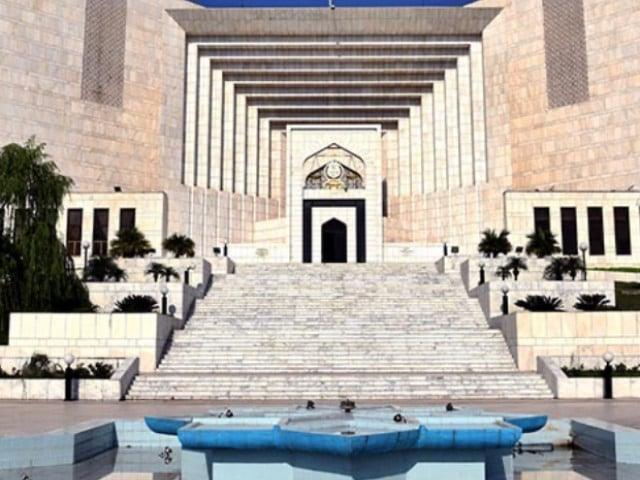ISLAMABAD:
The Supreme Court said that the Election Commission of Pakistan (ECP) failed to fulfill its constitutional duty to actualize the will of the people and conducted itself in a manner that is not consistent with its constitutional duty.
“It is regrettable that despite the clear pronouncements of this court, the ECP is behaving in a manner that is not consistent with its constitutional duty.
“Instead, [its conduct] This is consistent with the notion that they have the constitutional power to disregard other constitutional institutions and the fundamental right to vote,” said a six-page supplementary note written by Justice Ayesha Malik in the case of MP Adil Bazai.
Justice Ayesha was part of a three-member bench headed by Justice Syed Mansoor Ali Shah and including Justice Aqeel Ahmed Abbasi which on December 12 unanimously overturned the ECP’s decision to disqualify Bazai on the grounds of his alleged defection under Article 63A of the Constitution.
The judge whose opinion was supported by two other members of the judiciary reminded the ECP that elections are the lifeline of democracy and that the ECP is the guarantor of electoral integrity.
“The independence of the ECP is therefore fundamental to the electoral process without which the very foundations of democracy are compromised.
“This court also recognized and declared that the ECP should not submit to political influences, nor political engineering, but rather remain an impartial guardian of democracy, because any tendency of the ECP in favor of the government would undermine the legitimacy of the political system.
“At the heart of protecting electoral integrity is the right to vote and the exercise of that right by the people. Voting supremacy underscores the idea that power and legitimacy in a democratic system derive their consent from the people. “That is why an independent constitutional body is necessary to ensure that the will of the people through elections is actualized.”
He said the facts of the present case compelled the judiciary to reiterate once again that the constitutional duty of the ECP cannot be considered as an overriding constitutional power vis-à-vis other constitutional provisions and institutions .
“The ECP is, in accordance with the constitutional mandate, an independent body, which has the duty to conduct free and fair elections and the duty to ensure that the people’s elected representatives remain in government.
“The independence of the ECP is the fundamental guarantee of a democratic system that maintains the integrity of elections and ensures that the will of the people is translated into their consent to be governed by the elected representatives.”
He said this independence gives legitimacy to the government because it is based on the choice of the people. It is what builds public trust, protects the rule of law, and protects citizens against political manipulation. »
“The Constitution expressly provides that the authority of government rests solely on the will of the people. This will is manifested through the exercise by the people of their right to vote and to participate in the electoral and political process.
“Elections are the primary means by which registered voters elect representatives who will govern on their behalf and exercise the powers of government. This is a fundamental right guaranteed by the Constitution,” it adds.
In the main verdict written by Justice Syed Mansoor Ali Shah and approved by the other two members, the SC noted that the ECP’s findings on the authenticity and validity of the consent affidavit dated February 16, 2024 were contrary to the weight of the elements presented in the file. and legally untenable.
The PML-N claimed that Bazai, an independent candidate who won elections from Quetta’s NA-262 constituency, had initially submitted an affidavit to join the party.
However, he later “switched allegiance”, according to the PML-N, and became a member of the Sunni Ittehad Council (SIC), a party comprising independent candidates supported by the PTI.
Bazai had claimed that the affidavit regarding his joining the PML-N was false. The ECP, however, removed him from his seat due to the 2017 electoral law on November 21.
The SC said that since Bazai was not a member of the PML-N parliamentary party, the statements made by the PML-N leader regarding the defection of the appellant from that party, and their confirmation by the ECP through the impugned orders, were without jurisdiction.
“Accordingly, these appeals are allowed. The impugned orders passed by the Commission are set aside and the statements made by the leader of the PML-N party that the petitioner had defected from the said political party are not confirmed.
“Accordingly, the appellant’s membership in the National Assembly from seat NA-262 is reinstated as an independent member and not as a member of the PML-N parliamentary party.”
The court, however, clarified that the finding of this court regarding the authenticity and validity of the consent affidavit dated February 16 was subject to the final decision of a civil court.
“Given the seriousness of the appellant’s allegations regarding the making and use of a false affidavit of consent against Shehbaz Sharif, the then President of the PML-N and now the Prime Minister of Pakistan, we expect what the civil court, where the civil action is the pending instance, and the magistrate before whom the criminal complaint is awaiting judgment, will have to decide as soon as possible,” he said.




